

MASK AND WIG WANTS YOU!

We’re looking for talented and dedicated undergraduate students to join all four sections of the Club:
CAST BAND:
Actors, writers, singers, dancers, comedians. Instrumentalists. Drive the beat of our productions!
STAGE CREW: BUSINESS STAFF:
Tech wizards, builders, designers. Marketers, managers, finance gurus.
AUDITIONS & INTERVIEWS
August 31st and September 1st

Scan the QR code for more information!
@maskandwig
FREE SHOW AUGUST 29TH!
Experience the energy, the music, and the laughs live at our Free Show with Bloomers on August 29th.

at Penn
A guide to the campus essentials that will shape your frst-year experience
AYANA CHARI AND ANVI SEHGAL Senior Reporters
Welcome to Penn, Class of 2029! Here’s everything to know about on-campus housing, dining plans, student health services, study spots, and other campus essentials that will shape your first-year experience.
On-campus housing
Penn students are required to live on campus for two years. There are six first-year College Houses — Riepe, Fisher Hassenfeld, and Ware in the Quad; Hill; Kings Court English; and Lauder College Houses — and three four-year houses — Gregory, Stouffer, and Du Bois College Houses — where both new and returning students can live. In the Quad, newly renovated Riepe and Ware dormitories will be open to first years, while Fisher-Hassenfeld will remain under construction. Room options include singles, doubles, and triples, with communal bathrooms on each floor. With a reputation for being the social hub for first-year living, the Quad boasts large courtyards, music and game rooms, and the Cafe at McClelland.
Hill, located on the corner of 34th and Walnut streets, has single and double rooms, is home to the Benjamin Franklin Scholars program residential community, and has a dining hall on its lowest level. The nearby Lauder has suite-style rooms, each equipped with its own bathroom, and a dining hall. Kings Court English College House — also known as KCECH — is located on Sansom Street. It has single and double rooms, shared bathrooms, and a dining hall.
Gregory offers suite-style single, double, and quad rooms, with private bathrooms in its two buildings adjacent to Locust Walk. Stouffer, located near the Quad, includes Stouffer Hall and Mayer Hall, with the former containing traditional dormitory-style rooms for first-year students. Du Bois — the smallest house, featuring suite-style singles, doubles, triples, and quads — provides a focus on Black American scholarship and culture.
Dining options
There are six dining halls and eight retail dining locations on Penn’s campus. Penn students are required to be on a dining plan for two years. Meal swipes can be used at residential locations and Dining Dollars at retail locations. The largest dining hall on campus is 1920 Commons — often just called “Commons” — which offers new made-to-order dishes each day and a variety of premade options. Lauder’s dining hall, open
for dinner only, has new featured dishes and several self-serve dishes. Quaker Kitchen — Penn’s newest dining hall, serving dinner in Gutmann College House — offers unique menus that require day-of reservations made through the Penn Mobile app. Known for its freshly made chicken — or veggie — wraps, Falk Dining Commons in Steinhardt Hall offers a fully Kosher menu and is open to all students.
The Commons building also houses Gourmet Grocer and Starbucks — nicknamed “Grommons” and “Stommons,” respectively — which accept Dining Dollars. Pret A Manger, located on the ground floor of Huntsman Hall, has both indoor and outdoor seating.
Houston Market, a popular retail dining spot located in the basement of Houston Hall, has eight different stations that offer options to use both meal swipes and Dining Dollars. When the fruit in the dining halls doesn’t strike your fancy, get some fresh produce at the on-campus farmers market, which accepts Dining Dollars and is located outside the Penn Bookstore.
There are also many opportunities to snag a free bite around campus. For quick snacks and prepared foods, there are two Wawa locations on campus, as well as plenty of familiar chains, including McDonald’s, Chipotle, Raising Cane’s, Qdoba, Panera Bread, and Sweetgreen.
Fraternity and sorority life
An estimated 25% of Penn’s student body participates in fraternity and sorority life, and the Office of Fraternity and Sorority Life houses 39 Greek-lettered social organizations led by the Interfraternity Council, Panhellenic Council, and Intercultural Greek Council. Students are required to have at least four course units completed to be eligible and must also have a cumulative grade point average of at least 2.50 to participate in a Greek-lettered organization.
Both on-campus and off-campus groups will host events in the fall prior to formal rush to gauge students’ interest in joining. There are 21 IFC organizations — 20 men’s and one co-ed — and seven all-women Panhellenic organizations, all of which rush during the spring semester. Registration for spring recruitment requires a fee, and each organization requires various annual dues.
The IGC chapters — which are affiliated with various cultural identities — have unique recruitment schedules.




Student health services
Wellness at Penn, located at 3624 Market St., is responsible for the majority of health and well-being resources on campus and is centered around two pillars: Student Health and Counseling and Public Health and Wellbeing. The Student Health and Counseling team focuses on offering confidential medical care and counseling, while the Public Health and Wellbeing team looks to help students through “education, advocacy, and action.” Services range from primary care and sports medicine to individual and group therapy.
Wellness at Penn offers additional resources, including Peer Wellness Coaching, and works with other campus partners to operate the Penn Farm — which is located on campus in Penn Park and hosts various wellness programming opportunities. Wellness at Penn also hosts an annual flu clinic, which will run from Oct. 15-17 and offer free flu shots to the Penn community. Penn Medicine also operates two emergency rooms in West Philadelphia: one at the Hospital of the University of Pennsylvania and another at Penn Presbyterian Medical Center.
Penn’s student-run Medical Emergency Response Team also works with Penn’s Division of Public Safety and the Philadelphia Fire Department to offer pre-hospital emergency medicine treatment. MERT operates 24/7 on weekends and from 7 p.m. until 5 a.m. on weekdays, and it is staffed by Penn students who are certified emergency medical technicians. When MERT is dispatched, the Philadelphia Fire Department “is dispatched simultaneously,” according to the MERT website, to allow for transport to a hospital if necessary.
Penn also follows a medical amnesty policy for students seeking medical help related to alcohol or drugs. “No student seeking medical treatment for an alcohol or other drug-related overdose will be
subject to University discipline for the sole violation of using or possessing alcohol or drugs,” the policy reads. “This policy shall extend to another student seeking help for the intoxicated student.” Penn Violence Prevention is an on-campus organization “committed to ending interpersonal violence” through trainings and confidential resources. Finally, the Pottruck Health and Fitness Center is free to all Penn students. The Walnut Street center houses four floors of cardio equipment, weightlifting equipment, a basketball court, a climbing wall, and multipurpose space. Libraries and study spots
Penn has 10 library buildings and even more study spots. As a first year, take the time to find a couple of locations that fit your needs for different classes. Members of the Penn community can book a Group Study Room through the Penn Mobile app. The app asks for a PennKey login and allows users to book a GSR up to one week in advance, but an individual room can only be booked for a limited amount of time per day. Wharton undergraduates lay claim to Huntsman Hall, which features GSRs that can only be booked using a Wharton PennKey. Amy Gutmann Hall — featuring classrooms, labs, group areas, and individual pods — opened its doors exclusively to Engineering students last spring. Fisher Fine Arts Library is a classic library study spot, with spiral staircases, nooks between bookshelves, seminar rooms, and near-complete silence that is perfect for studying without distractions. Van Pelt-Dietrich Library is also a go-to, featuring bookable study rooms in the windowless basement; a communal, sunlit reading room; social study booths; and the stacks for secluded individual studying. Other study spots include Holman Biotech Commons, the Perelman Center for Political Science and Economics, and the Academic Research Building, all of which have GSRs and various seating options.
































As the ink dries on personal apology letters and records change on athletic websites, our University enters a new era.
We have gained the reinstatement of $175 million in federal funding. But what have we lost?
The freedom to make our own decisions. The ability to protect our students. The foundation of a strong moral compass. Penn’s recent compliance with the demands of 1968 Wharton graduate and President Donald Trump’s administration has proven that the University is willing to sacrifice its values under pressure. In allowing the federal government to make a decision that belongs to our community, Penn has violated our trust in a way that may be impossible to restore.
This editorial isn’t about the swimming and diving team. It isn’t about NCAA guidelines or biological sex characteristics. It is about a precedent that Penn administrators have set. Our administration is willing to negotiate with a government that has proven hostile to human rights. In doing so, it affirmed the belief that the Department of Education’s actions and demands were at all logical
Swipe right for
or legal and gave them power over our internal operations.
After months of uncertainty, the return of this research funding may offer us a false sense of stability. Penn can argue that with these few concessions, we are now able to proceed with essential research projects that make our world safer and healthier. It might feel like nothing has changed.
But the restored funding should not bring about a breath of fresh air or a sigh of relief. We should see it as a warning signal — because if Penn was willing to agree to these demands, what’s next?
Penn veiled this response as compulsory. But there was a choice. Our administration could have said no, fighting in court to keep the government out of our athletic policies. It’s true that there is fear associated with fighting.
After standing up to the Trump administration’s curriculum demands, Harvard University now faces billion-dollar funding freezes and suspended international enrollment, jeopardizing its influence, prestige, and affordability. These consequences are dire, and we have no interest
roomie
KAN SHE FIX IT? | And hope they don’t swipe left on you
A quintessential pre-first-year experience is looking for a roommate online before school starts. Stalking Instagrams, scrolling through pictures, and sending that all-important first message. Conversations feel like dating bios with lines like: “Looking for someone who laughs at my terrible jokes, won’t judge my midnight ramen obsession, and loves going out … and staying in!”
But beneath the Instagram DMs and curated bios, which honestly feels like a weird pseudo-dating ritual, is something bigger: the first time since getting in that you’re really being perceived by your new college community. It’s also one of the first moments that students start to adjust themselves based on what they find the Penn community expects.
Here’s how it goes: You follow each other back on Instagram (it’s a match!), you slide into their DMs (anyone know any roommate pickup lines?), you have your first conversation filled with nervous small talk and subtle tests to establish trustworthiness. Maybe you part ways politely. Maybe you get ghosted. Maybe, if you’re lucky, you FaceTime! Of course, much like dating, everyone’s trying to seem cooler and way more put together than they really are. Because just like dating, we’re making ourselves vulnerable to rejection by people we think are good for us. There’s nothing wrong with wanting to put your best foot forward, especially when you’re swiping for a potential roommate as if Instagram is a dating app. Letting that instinct make its way into every interaction is when it becomes inauthentic.
When I was finding a roommate, I caught myself starting to perform a version of myself I thought college demanded. I introduced my interests by talking about popular music artists I liked because I thought mentioning my “Hamilton” obsession outfront would make me cringey. What starts as trying to find someone to live with becomes the introduction of a polished image meant to win approval, not just from a potential roommate, but from a whole new realm of people.
It’s a form of social risk management, a natural response to new surroundings driven by human emotion. Simply put, we do not want to be isolated from our community for the next four years. We often think the inability to resist peer pressure is a personal failure, but what if a structure around them
in pretending they are not.
But in the following decades, people will remember Harvard as the school that stood up to tyranny. Penn — if this pattern continues — will be remembered as the school that welcomed it with open arms.
There is an argument that if we had not appeased the Trump administration, it could have retaliated even more severely, revoking our visa sponsorship powers or freezing more funding. These results were possible, and they would have been heartbreaking. Yet even after conceding, they could still occur.
Trump is going after international students regardless of where they go to school. He has pledged to revoke the visas of Chinese nationals and has restricted the extension of student visas to seven countries on his travel ban list. Banning transgender athletes from athletic participation does not protect our international community — it only emboldens their attacker.
When Northwestern University came under fire for its handling of antisemitism, it repeatedly pledged to prevent
discrimination on its campus and published a progress report detailing new policies specifically focused on targeting antisemitism. The Education Department still froze $709 million in federal research funding to the university and has given no indication that it will restore the money. There are strings attached to every negotiation. Our concessions to the Trump administration do not automatically mean that the government will refrain from targeting our institution. On the contrary, it may perceive us as more vulnerable to its overreach. Just like Columbia University, we could be backed into a corner under threat of retaliation. Appeasement never ends the pressure. It escalates it. Columbia, Harvard, Northwestern — these institutions made different choices and still face consequences. What’s to stop the same from happening here, at Penn?
There are certain things that make Penn what it is: our diverse student body, including trans and international students; our groundbreaking research; and our strong commitment to advocacy. These are our core values. And they should never be used as bargaining chips by the federal government.
Penn cannot afford to make decisions based on fears about what Trump may do. The president acts erratically, and our University has mirrored that behavior instead of upholding its values to preserve stability. Throughout history, authoritarian regimes have begun their crackdowns with an attack on universities — beacons of dissent and social progress. We can’t ignore the warning signs. Penn’s actions are exactly what it looks like to give in to extortion disguised as governance. The attacks won’t stop — not for at least another 1,200 days. More threats will come, and when they do, our students deserve active protections rather than silent concessions. Penn made the wrong decision this time. Next time, for the good of our community, it must make the right one.
THE DAILY PENNSYLVANIAN SUMMER EDITORIAL BOARD consists of summer staffers in the Opinion Department, led by the DP’s Summer Opinion Editor Ingrid Holmquist. Questions and comments should be directed to letters@thedp. com.
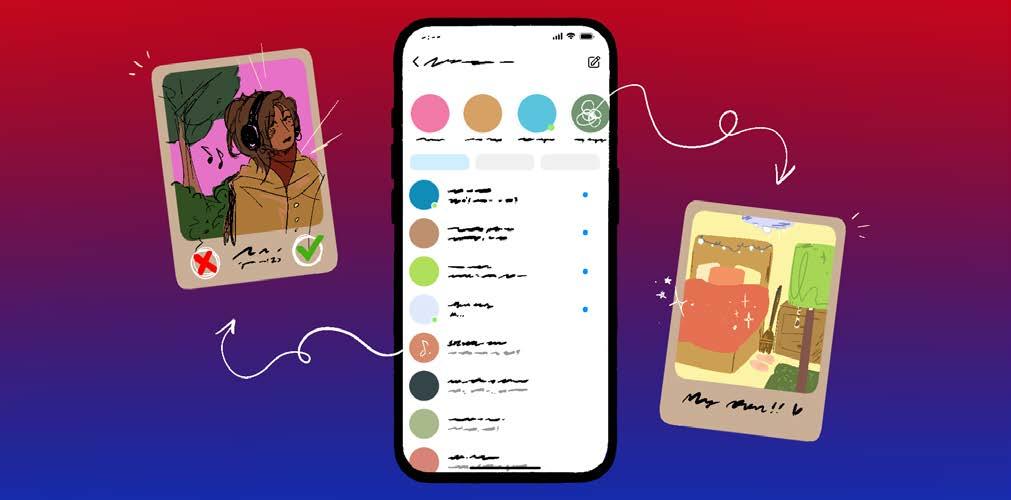
perpetuates that stress? Finding a roommate is just the first step. An obvious answer may be to stop caring about what others think altogether. But honestly, that’s kind of unrealistic.
A school like Penn creates huge expectations for unrivaled access to opportunities, and networking is a big part of taking advantage of those.
The truth is, by letting first years pick their own roommates, Penn begins to corporatize relationships before students even step foot on Locust Walk. We start to treat conversations like a sales pitch — only, we’re the product. Rather than trying to convince students to get rid of the normal urge to fit in, it’s time to call for institutional change instead.
While Penn does give students the option to go random, the issue lies in the fact that it also gives students the opportunity to pick their own roommates. This choice reinforces the idea of social bubbles, which create pressure to act a certain way in the first place. So while Penn’s options might be comfortable for some students, they can make the situation worse for others.
Many top schools choose all students’ firstyear roommates for them, including Harvard, Yale, Stanford, and Dartmouth. If picking your own roommate is like using a dating app, then letting your university decide your
roommate is like being set up by a mutual friend.
A third party sees the traits you have in common and matches you accordingly based on compatibility, such as sleeping habits and cleanliness, instead of optics. This makes us stop worrying about finding a roommate who is exactly like us, or exactly like who we want to be, and open our minds to new possibilities while (probably) minimizing the discomfort of rooming with someone with whom you have incompatible living habits.
What’s more, a third-party roommate match is likely to increase diversity. When you pick your own roommate, it’s tempting to minimize that social risk by trying to choose someone with similar traits to you, maybe the same hometown or intended major.
It just feels a lot safer. But when schools assign roommates, it removes that pressure and broadens student perspectives. A study done across Duke, Stanford, and Tufts even showed a significant increase in cross-race friendships and more positive interactions across people from different backgrounds when universities randomly assign all incoming first years a roommate.
Choosing your own roommate might feel like you get to swipe left or right on endless options to find “the one,” but it can actually
function more as a loop of endless talking stages. Suddenly, your terrible jokes and midnight ramen obsession become things you carefully hide, because you’re terrified of being ghosted. It forces incoming students to turn their genuine need for connection into a marketing pitch.
This pressure to get it right reduces the chance of making unexpected, meaningful friendships. If Penn removes the option to choose your own roommate, it would take away the idea that people need to impress their way into belonging on campus. It gives students the chance to show up as who they truly are and meet people they might not have initially thought that they would get along with.
Because let’s be honest, there are far more productive things to prepare for in college than pretending you’re someone you’re not. Most first years are still googling “How to do laundry?” and hoping no one notices. It’s time for Penn to make sure students can focus on the right kind of growth.
KANISHKA AGARWAL is a College first year from Cypress, Texas. Her email is agarwa1k@sas.upenn.edu.
In caving to the Trump administration, Penn betrays its motto
GUEST COLUMN | Penn has undermined its legacy as an institution founded to resist illiberal pressures

On July 1, Penn announced its intent to comply with the Trump administration’s Title IX overhaul, which mandates binary, biology-based definitions of sex in athletics. In a resolution agreement with the Department of Education’s Office for Civil Rights, the University committed to banning transgender women from participating in women’s sports. While Penn framed this as a matter of legal obligation, the truth is that this was a choice. In caving to the politics of the moment, Penn abandoned the moral commitments it once claimed to uphold and, in doing so, compromised both its values and its future.
The Biden administration’s 2024 Title IX reforms had left the issue of trans athletes unresolved, allowing institutions the autonomy to determine their own policies. In that legal vacuum, Penn made its own choice and allowed Lia Thomas, a transgender woman, to compete on the women’s swimming
and diving team in 2021 and 2022.
That decision was grounded in principles of dignity and inclusion. It was a moral stand taken at a time when the right-wing culture-war machine was already mounting its assault on trans rights. Our University held firm, not because it was forced to, but because our community believed it was right.
Penn’s motto, “Leges sine moribus vanae,” asserts that laws without morals are meaningless.
The University had already made its moral position clear; to now walk it back under political and financial pressure is a troubling hypocrisy.
Penn was founded not as a theological seminary like Harvard, Yale, or Princeton before it, but as a secular university invested in the future American republic. It aimed to fuse Enlightenment ideals with practical civic training: useful, morally grounded knowledge for a free people. Benjamin Franklin’s project was to build a university beholden not to
Home is where the habit is
traditions and the political maneuvering of institutions, but to truth.
Penn has honed that identity across generations. The University was one of the first to admit women for graduate study. Its students voiced opposition to the Vietnam War with sit-ins. In recent years, it offered refuge to transgender students by backing Lia Thomas, even as they were targeted by statewide culture wars.
It is shameful that, instead of challenging the federal interpretation of Title IX in court — a legally open and winnable argument — Penn chose to quietly negotiate with the federal government. The University could have asserted, as it did in 2022, that its inclusion of Lia Thomas complied with NCAA guidelines and respected the spirit of Title IX’s commitment to fair access. That case could have been litigated openly, inviting judicial review of how the law should apply to transgender athletes. Just last week, the Supreme Court agreed to hear a case on transgender student-athletes, confirming that this is precisely the kind of contested legal question Penn could have fought.
Despite its immense legal resources, a part of the sixth-largest endowment in the country, Penn acquiesced to the Trump administration’s demands in order to avoid the loss of $175 million in federal funds. That money matters, no doubt. Penn receives NIH grants that pave research into cancer immunotherapy, biomedical technology, community health, and more. Withholding these funds would harm both Penn and the country. But the University still had a choice — and it chose the path of least resistance. In doing so, it risks losing far more than just federal support or some abstract moral high ground.
Public trust in elite universities is already eroding. Right-wing opposition to academia’s perspective on gender identity aside, the combination of exorbitant tuition costs and exceedingly low acceptance rates continues to reinforce centuries-old elitist stereotypes about top national universities. In this climate, Penn both had and lost the chance
THE RAMIREZ REVIEW | When will we begin to allow our best to be good enough?
One hour and 45 minutes.
That’s how long I’ve been sitting in this Starbucks, second-guessing every single word of this column I try to type. Last month, I pitched an article to my editor that served as a tool I can use to reflect on my summer. Now, I’m still staring at a blank page. The issue that I’ve faced hasn’t been a lack of desire to write this piece. It’s been a lack of motivation to simply try.
Why has something I enjoy — writing — become a chore for me to even attempt? For starters, I need to better understand the state of my mental health before I continue pushing myself.
After an incredibly chaotic first year in Philadelphia, I wanted nothing more than to spend the summer at home with my family and friends. I’d had enough of Penn’s competitive atmosphere and was ready for a much-needed break. Not wanting to lose any academic momentum, I started looking for internships in my hometown, El Paso, Texas. Months in advance, I perfected my resume and started cold-calling local law firms. However, it was to no avail. No firms were looking to bring me on board. Disappointed, I resorted to working my high school job as a barista, hoping to earn some money while anxiously holding out for an internship opportunity later in the summer.

Your 1600 doesn’t matter anymore
GOTT TO KNOW | Intelligence in the age of artifcial intelligence
For most of modern history, we have defined intelligence in numbers: test scores, IQs, GPAs. A high SAT score once meant you were smart and full of potential. But in 2025, “intelligence” only costs $20 a month. For the price of three Starbucks lattes, a chatbot can out-write you, outcode you and out-analyze you. It doesn’t sleep. It doesn’t charge by the hour. It never needs breaks. It just runs.
Of course, the SAT has never been perfect. Still, it has provided a ubiquitous data point for college readiness among applicants. Similarly, the IQ test quantifies one’s ability to use information and logic to make predictions. For decades, these were indicators of success. While they didn’t measure everything, they aligned with what our economy rewarded: precision, pattern recognition, and speed.
In a world where artificial intelligence can outperform humans in all three, these numbers don’t mean what they used to. While knowing facts may help you win trivia night, AI doesn’t just memorize. It ingests, integrates, and applies information in milliseconds. No matter how quickly you think, you will not beat a machine trained to process billions of data points in real time. It executes reasoning tasks with precision and consistency. To compete with AI on its terms is not only difficult, but it is also fundamentally impossible to win.
This doesn’t mean humans are obsolete. It means that the definition of intelligence is shifting from retention to application, from knowing answers to asking the right questions. As a result, the workforce is changing. AI has
the ability to make recent graduates far more efficient and productive than those with decadeslong careers — not because they know more, but because they know how to leverage machines that do. AI doesn’t just speed up tasks — it enhances decision making, streamlines workflows, and provides access to insights that previously took years to develop. It makes expert-level output more accessible and less dependent on time served.
In 2020 (back to the pre-ChatGPT days), the World Economic Forum reported that 97 million jobs will be created for the development of AI and human-AI collaboration. Indeed found that manufacturing, retail and commerce, transportation, data analysis, and financial analysis roles are very likely to be taken over entirely by AI. However, those who can develop AI, like machine learning engineers, data scientists, and software developers, will be safe.
The critical divide will no longer be about high scores and low scores — it will be between those who can work with AI and those who cannot. To succeed, you no longer need to be the best at doing what a machine can do. You need to be good at doing what a machine cannot: Frame the problem, direct the tools, synthesize the results, and ask what’s next. To be smart today is to be AI-literate — to prompt, evaluate, iterate, and apply.
In other words, asking the right question is now more valuable than knowing the right answer.
If you’re still operating in a world where standardized tests define talent, you’re behind. Not because these tests are useless, but because they no longer reflect the skills that the future
to regain its favor with the American psyche by standing by its scruples. If our University continues folding to political pressure, principled Americans will disavow their support for a Penn that no longer upholds its foundational values, thus harming the University’s standing for years to come.
To my peers in the incoming Class of 2029, I urge you to remember the words shared with us by Dean of Admissions Whitney Soule at Quaker Days: We were admitted not as idyllic “Penn students,” but as “the students that will make Penn.”
We are a part of one University, but our morals are our own. In the spirit of “Leges sine moribus vanae,” we must recognize our obligation to protect discourse relevant to the pursuit of the enlightened, informed governance envisioned by Benjamin Franklin. The question before us is not merely whether trans athletes should be included, though that matters deeply. The question is how we decide.
Penn reneged on its values, ignoring our community’s decision. When challenged by the government, the decision should’ve unfolded openly — argued in court, debated beneath the trees of Locust Walk — it should certainly not have been through closed-door dealings on Capitol Hill.
Law is not inherently sacred; it must be made worthy. Law without a moral compass is misguided, unworthy. If the University refuses to follow its moral compass, it is up to us as students to help reset its course: We must dissent to the University’s transactional forfeiture of our autonomy and lead principled, open discourse as students when our University will not.
SOHUM SHETH is a College first year from Jacksonville, Fla. studying public policy and governance. His email is sheth0@sas.upenn. edu.
Eventually, I gave up on the internship search and picked up more shifts. I hate to admit it, but I became someone who based my self-worth on that rejection. I couldn’t understand why none of my professional pursuits were successful if I had been working so hard academically.
Being back home and feeling burnt out led to falling back into the old habits that I had worked so hard to overcome. I started getting home past curfew, sleeping in far too late, calling out of work, rotting in bed, and smoking more cigarettes than I care to admit.
It wasn’t until just now, when I began to attempt to write this article, that I finally realized: The burnout and stress I’d been dealing with were entirely self-imposed.
I had fallen back into old habits as a coping mechanism. I was too stubborn to understand that I was putting myself under pressure. No matter how much I brought up my GPA, how many cold calls I made, how hard I worked, I continued demanding unrealistic perfection from myself. I couldn’t accept my best as good enough.
I’ve since learned to feel proud of my achievements, and I won’t lose sight of my personal goals moving forward. Additionally, I want to learn from the mistakes I made this summer to push myself toward more realistic, long-term goals. My biggest mistake was my choice to come home for the summer.
At the forefront of my pursuits is a desire to grow into the best version of myself, and I’ve always known that in order to do that, I need to grow as a person outside of El Paso. Because I got so caught up in the chaos of my first year, I allowed myself to fall back on the stability and security of my hometown. However, choosing not to explore my identity outside of El Paso led to me slipping back into a version of my 17-yearold self. Strangely enough, my hometown seems
to have remained exactly as I remember it being when I left for Penn. This summer has taught me that El Paso will always be the same. While I needed rest, I forgot that I chose to leave El Paso, aspiring to escape this bubble and venture into a new chapter.
Moving forward, I’m prioritizing balance. I now recognize that it’s crucial to push myself to reach my goals without conforming to outside pressures or compromising my mental health.
So, as I sit here in Starbucks, finally finishing this column a month after I pitched it, I will not allow myself to criticize how I spent my summer.
I didn’t take any summer classes, reach 500 LinkedIn connections, or get an internship. But I did spend time with friends and family who I missed while I was away; reconnect with customers and co-workers who have helped push me out of my shell; read a few books — a hobby I never got to work into my school schedule; make money to support the cost of living in Philadelphia; listen to a lot of music — even getting to hear some of my favorite artists live; take time to distinguish my personal goals from those of others around me, which helped me prioritize self-growth over professional or academic productivity; and, most importantly, book my one-way flight out of Texas and back to Philadelphia.
So while El Paso will always be home, I’m ready to continue the journey that I embarked on last August. While the future feels uncertain, I’m ecstatic to continue striving for personal and professional growth.
RAMIREZ is a College sophomore studying political science from El Paso, Texas. His email is elijah11@sas.upenn.edu.
demands.
In the past, leaders didn’t need the highest scores — they just needed to be sharp, driven, and good with people. That used to be enough. But not anymore. Today, the ones who will lead are those who will adapt the fastest. Who rethink what it means to be smart. Who treat AI not as a threat but as a collaborator, a force multiplier. Those who don’t fear being replaced because they’ve already figured out how to make themselves
indispensable. The question isn’t whether AI will replace you. It’s whether you know how to use it well enough that it won’t have to.
CASEY GOTTLIEB is a Wharton first year from New York. Her email is caseygot@wharton. upenn.edu.
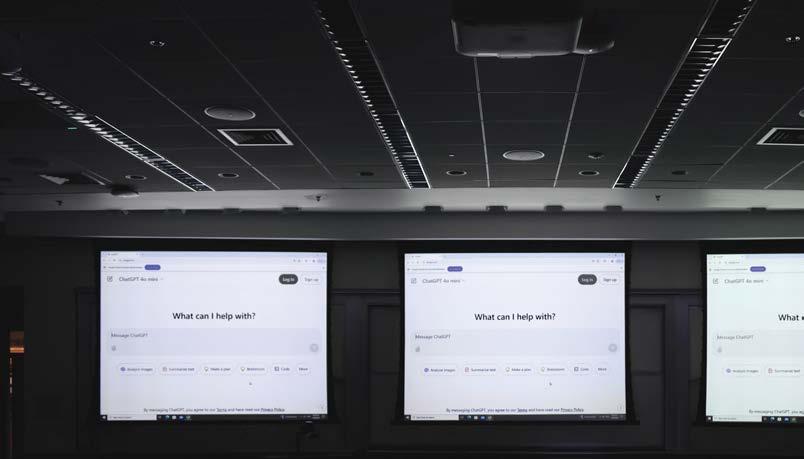

How two years of federal scrutiny shaped today’s
Penn
The University has navigated student protests, leadership shifts, and new federal mandates — many of which stem from controversies that frst erupted two years ago
ISHA CHITIRALA AND FINN RYAN Senior Reporters
For the past two years, Penn has been at the center of national debates over free expression, federal oversight, and the role of higher education.
The 2024-25 academic year at Penn was defined by heightened political attention as the federal government increased its scrutiny of higher education institutions nationwide. Throughout the year, the University navigated student protests, leadership shifts, and new federal mandates — much of it stemming from controversies that first erupted two years prior.
Early in the fall 2023 semester, writers and performers gathered in Irvine Auditorium to celebrate Palestinian art and culture while discussing their right to national independence. The event, titled the Palestine Writes Literature Festival, immediately drew criticism from students, alumni, and national Jewish groups who objected to the inclusion of speakers that they alleged had made antisemitic remarks.
Despite a statement from then-Penn President Liz Magill condemning antisemitism, many faculty members and prominent alumni donors urged the University to take a stronger position against the festival. As tensions escalated following Hamas’ Oct. 7, 2023 attack on Israel, members of the University Board of Trustees called for the resignations of Magill and the Board of Trustees’ then-Chair Scott Bok.
The controversy erupted on the national stage on Nov. 1, 2023, when more than 20 members of Congress sent a letter to Magill criticizing the University. Fifteen days later, the Department of Education launched an investigation into Penn over allegations of campus antisemitism.
Magill faced widespread backlash for her congressional testimony, in which she said that whether calls for the genocide of the Jewish people violated Penn’s code of conduct was “context dependent.” On Dec. 9, 2023, Magill stepped down from her role as Penn president. Minutes later, Bok announced his own resignation as chair of the Board of Trustees.
Current Penn President Larry Jameson — who was dean of the Perelman School of Medicine at the time — was appointed to the presidency in an interim capacity following Magill’s resignation. He officially became Penn’s 10th president in March 2025.
The administrative overhaul did little to halt the rise of campus activism and public scrutiny. Penn became the site of multiple demonstrations, including a 16-day Gaza Solidarity Encampment on College Green that began on April 25, 2024.
After weeks of protests, rallies, and negotiations with administrators, Penn Police officers — assisted by the Philadelphia Police Department — dismantled the encampment and arrested 33 people, including nine Penn students, on May 10, 2024.
The move, which followed the University’s decision to
place six student organizers on mandatory leaves of absence, drew strong criticism from members of the Penn community and local elected officials.
On June 6, 2024, Penn announced a temporary set of guidelines for campus demonstrations and began the process of reviewing its open expression policies. The University also unveiled several new security measures, including a ban on encampments and the installation of barricades around College Green and along Woodland Walk.
As students returned to campus for the fall 2024 semester, conversations on campus shifted to the presidential election between the United States’ then-Vice President Kamala Harris and 1968 Wharton graduate and President Donald Trump.
Philadelphia — located in the key battleground state of Pennsylvania — quickly became a hotspot for rallies and campaign events. Penn voted overwhelmingly in favor of Harris, who received 81.6% of the votes cast on Election Day across four campus polling locations.
Trump’s victory reinvigorated the federal government’s effort to reform higher education. Early on, his administration rolled out multiple executive orders targeting universities, including a mandated termination of any diversity, equity, and inclusion programs in potential violation of federal civil rights laws.
In response, Penn scrubbed the University’s main diversity and inclusion website, renaming it to “Belonging at Penn.” The University also removed references to DEI initiatives and programs from the websites of all four Penn undergraduate and 12 graduate schools.
On Jan. 29, Trump issued an executive order directing federal agencies to identify and deport non-citizen students — including college students — participating in pro-Palestinian protests.
In February, $240 million of Penn’s funding from the National Institutes of Health was jeopardized after the agency issued a directive capping “indirect costs” — which fund overhead expenses including laboratories and support staff — at 15%. Earlier this month, the NIH reinstated funding for three grants following faculty appeals and federal court rulings in lawsuits challenging the executive action.
One month later, an additional $175 million of Penn’s federal funding was frozen by the Trump administration. The decision, according to the White House, was due to Penn’s “policies forcing women to compete with men in sports.”
In April, the Education Department found Penn in violation of Title IX for allowing 2022 College graduate and transgender woman Lia Thomas to compete on the women’s swimming and diving team during the 2021-22 season. The Education Department gave the University 10 days to “voluntarily” respond to a set of three demands or risk losing federal funding.

To recoup its frozen funding, Penn entered into a resolution agreement with the White House in July. The University removed Thomas’ individual records and issued a public statement specifying that Penn Athletics “will adopt biology-based definitions for the words ‘male’ and ‘female’ pursuant to Title IX and consistent with President Trump’s Executive Orders.”
Penn’s agreement — which several Trump administration officials suggested could serve as a “model” for other institutions — was quickly followed by the announcement of settlements by both Brown University and Columbia University, along with the start of similar negotiations with other peer institutions.


In his July 1 message to the Penn community regarding the settlement, Jameson wrote that the University’s “commitment to ensuring a respectful and welcoming environment for all of our students is unwavering.” He cautioned, however, that Penn “must comply with federal requirements, including executive orders” and mandates from other institutions.
While political scrutiny of Penn has dampened in the weeks since the settlement, the University still faces external efforts to reshape its policies, from an ongoing investigation into potential price-fixing within the Ivy League to a lawsuit challenging early decision admissions at elite institutions.


$10 STUDENT TICKETS
Use promo code PENNSTUDENT to enjoy

*Must
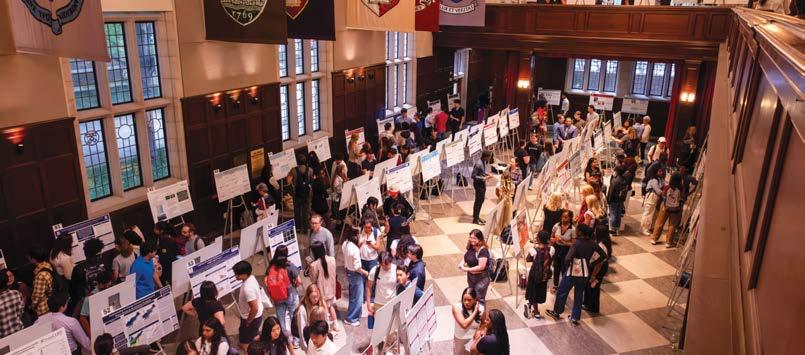
As an incoming Penn student, you may have some questions about how to get involved on campus — and how to make money doing so.
Whether you’re looking to dive into research, land a campus job, or get paid while exploring new experiences, Penn offers a wide range of financial support for students. From research fellowships and leadership roles to grants for travel, internships, and club activities, here are just a few of the many funding opportunities at Penn.
Research
For students interested in research, your first stop should be the Center for Undergraduate Research and Fellowships.
CURF runs both the Penn Undergraduate Research Mentorship Program and Summer Humanities Internship Program. PURM and SHIP each give students the opportunity to undertake faculty-mentored research over their first-year and sophomore summers in a wide range of academic fields. Both programs are 10 weeks long and award students upwards of $5,500.
CURF’s website also features a complete guide on all independent research grants and funding opportunities at Penn.
Penn’s MindCORE Summer Fellowship Program provides summer funding for students interested in neuroscience, computation, and psychology research. As a part of the fellowship, students also get technical training, mentorship, and professional development opportunities.
In the social sciences, Penn’s Program on Opinion Research and Election Studies also runs a paid fellowship in the fall, spring, and summer terms. PORES fellows support a wide variety of data-driven political science research, and some even have the opportunity to work with the NBC News Decision Desk during election cycles.
Campus jobs
If research is not your forte, there are also plenty of opportunities to hold a campus job.
Students can apply to become a residential advisor in Penn’s College House system. As part of their role, RAs are tasked with supporting students who are living on campus
If
cover living, travel, and other expenses for unpaid summer opportunities.
Recreational funding
Penn also has opportunities to get funding for activities and experiences unrelated to research or work. Penn provides significant funding support for travel experiences. Whether it be internships or coursework, various grants and scholarships are available for students pursuing opportunities abroad. One popular program is the Global Research and Internship Program, which offers students funded research and internship experiences in foreign countries. Recent student destinations have included France, Singapore, and Australia. If you are looking to receive club funding, the Student Activities Council can provide funding to support club events or development, with some established clubs even providing funded leadership positions.

Senior Reporter
Philadelphia, here’s a list of free perks that come with being a Penn student.
Subscriptions By logging in with Penn credentials, students receive access to a range of media, academic, and entertainment subscriptions.
For your daily news, look no further than Penn Libraries, which provides free subscriptions to The New York Times, The Washington Post, The Wall Street Journal, The Atlantic, Le Monde, Bloomberg, and The Financial Times. To use these subscriptions, students simply need to register for an account on each website using their PennKey. Students can access The Philadelphia Inquirer for free when connected to AirPennNet Wi-Fi.
As a major research institution, Penn also maintains a variety of open-access agreements with academic publishers such as Springer, Elsevier, and Cambridge University Press. Students can access a variety of the publications’ academic journals such as Nature, Science, and Cell Press by logging in with their Penn credentials.
Finally, students living in on-campus housing can access Xfinity digital streaming by logging into Xfinity on Campus with a PennKey. With this subscription, students get full access to 291 channels including ESPN, TNT, and CNN, which they can access on their mobile devices by downloading the Xfinity Stream app.
Transportation Getting around Philadelphia can be hectic, but a PennCard makes it easier.
Penn Buses operate on three fixed bus routes Mondays through Fridays from 4 p.m. to 12 a.m. Students can ride these — as well as all Drexel University bus services — for free by showing their PennCards.
LUCY — or Loop through University City — also offers a free SEPTA shuttle for Penn students from campus to 30th Street Station from 6:10 a.m. to 7 p.m. Monday through Friday.
If you’re looking to get out of Philadelphia, Amtrak offers a 15% national student discount, and Penn students are also eligible for a 25% New Jersey Transit discount.
Finally, before and after major school breaks, Penn’s Undergraduate Assembly offers free shuttle service to the Philadelphia International Airport for undergraduate students.
Technology Penn Libraries offers a wide range of technologies that students can check out and use with a valid PennKey, including phone and laptop chargers, gaming consoles, and 3D printers. Students can browse Penn’s technology offerings and where to access them on Penn Libraries’ equipment directory.
Penn students can also receive discounts on certain Apple, Dell, and Lenovo purchases, and some students may qualify for discounted AT&T Wireless or Verizon cellular service.
If you’re struggling in a class, you’re not alone — Penn students also receive free access to a variety of educational software, including Mathematica and MATLAB.
Experiences
Finally, a PennCard can be a magic ticket to a variety of activities on and around campus.
All Penn students receive free admission to the Morris Arboretum, a 92-acre, Victorian public garden operated and maintained by Penn, as well as the Penn Museum, an archaeology and anthropology museum that houses over 1 million objects excavated from around the world.
If you’re looking for a new way to stay active or to support a friend, have no fear: Penn students receive discounted tickets to the Class of 1923 Ice Skating Rink, as well as $10 tickets to any Penn Live Arts performances by using the promo code PENNSTUDENT and showing a valid PennCard and email.




Here’s what you missed at Penn this summer
What to know as the fall semester approaches
JACK GUERIN Senior Reporter

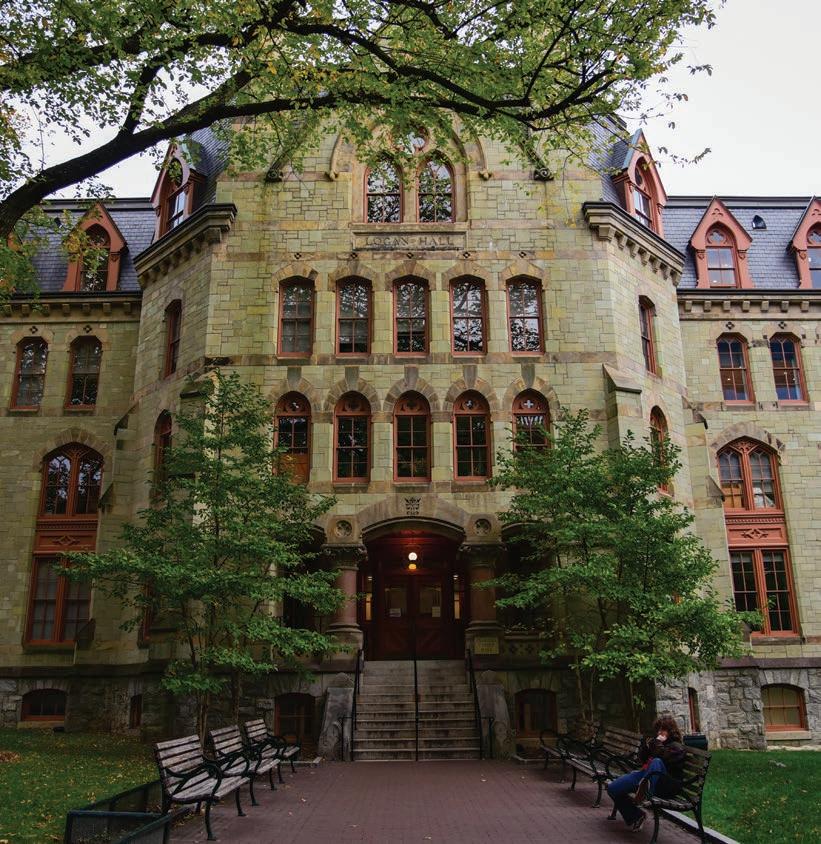
Construction at Penn


Life in West Philadelphia
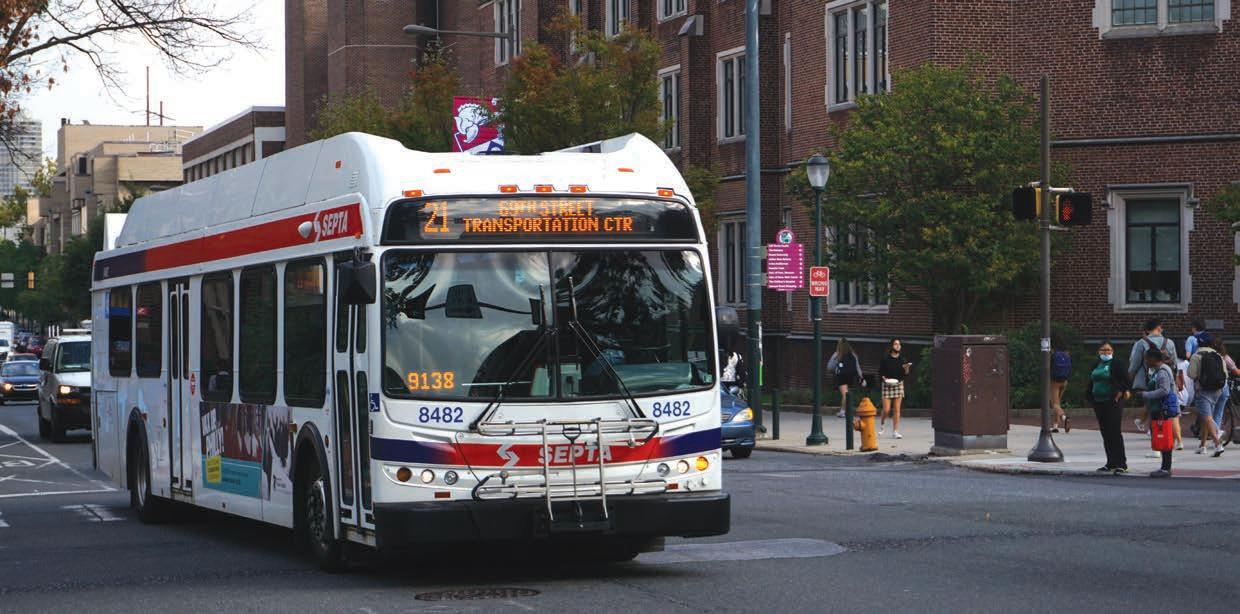



A guide to Penn’s cultural and afnity groups
The University offers numerous offces, resource centers, and student organizations to help frst years fnd support and community on campus
SAMANTHA HSIUNG Senior Reporter
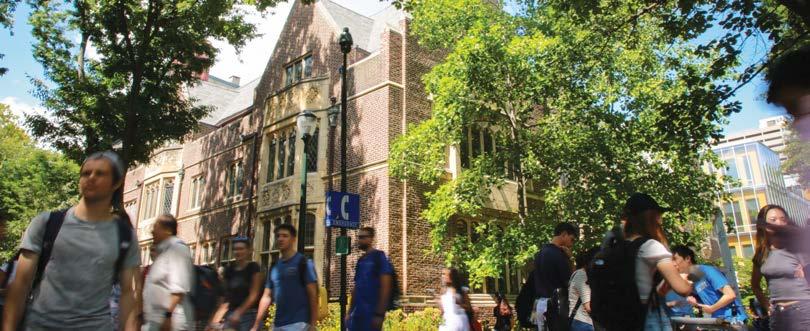
As students arrive on campus for their first semester at Penn, many are navigating not only academic life but also integration into new communities.
The University offers a wide range of offices, resource centers, and student organizations dedicated to providing support and a sense of belonging for students of all backgrounds. Here are some groups to know:
Affinity and cultural groups
At the heart of Penn’s cultural advocacy landscape is the 7B — a coalition of student organizations that represent minority groups on campus. The 7B includes the Asian Pacific Student Coalition, Lambda Alliance, Latinx Coalition, Natives at Penn, Penn Association for Gender Equity, UMOJA, and the United Minorities Council.
In May 2022, the 7B came to an agreement with the University to expand the cultural resource centers housed in the ARCH building’s basement at 3601 Locust Walk.
The expanded space now spans all four floors of the ARCH building and offers student organizations access to study rooms, social areas, and office spaces.
The ARCH is home to three of Penn’s cultural resource centers: the Pan-Asian American Community House, Makuu: The Black Cultural Center, and La Casa Latina.
Other cultural resource centers across Penn’s campus include the LGBT Center located at 3907 Spruce St., the Penn Women’s Center at 3643 Locust Walk, the Greenfield Intercultural Center at 3708 Chestnut St., and the Spiritual and Religious Life Center at 240 Houston Hall.
The various centers will host open houses, welcome dinners, and receptions throughout the end of August and September — all of which are available for new students.
Support for first-generation, low-income students
Beyond cultural groups, Penn also offers specialized support for FGLI students.
The Penn First Plus office supports students who are
the first in their families to pursue a four-year baccalaureate degree or come from modest financial circumstances. This center reports to the deputy provost and collaborates with the University Life, Student Engagement, and Financial Aid departments.
P1P oversees programs such as the College Achievement Program, which provides personalized support, academic guidance, educational workshops, and cultural enrichment opportunities for students from their first year through graduation.
Participants are assigned a professional academic counselor and a peer mentor to assist in the college transition process. They are also invited to attend a variety of events — including museum visits, theater performances, musical events, and cultural dinners — at no cost.
The Shleifer Family Penn First Plus Center — one of P1P’s offices — is located on the garden level of College Hall, offering lounge space, study rooms, meeting areas, and free printing. Academic counseling team members in PennCAP are based in suite 240 of Hamilton Village.
Resources for international students
International Student and Scholar Services supports Penn’s community of more than 11,000 international students, scholars, and employees from over 137 countries. The office provides guidance on immigration, employment authorization, United States border entry, and integration into the Penn community.
ISSS also oversees initiatives such as the International Student Advisory Board, International Student Table for Advocacy & Relations, International Partners Outreach Group, and Building International Student Integration Group — all of which aim to gather feedback, advocate for policy improvements, and design new initiatives to further support the needs of international students on campus. ISSS will host several events during International Student Orientation, which began on Aug. 18 and will continue through Aug. 22.

Penn’s club scene: The performing arts to the preprofessional
The Daily Pennsylvanian compiled a categorized, non-exhaustive list of Penn clubs to ease the stress associated with the extracurricular experience

Arts and culture clubs
Penn boasts a range of performing arts clubs with strong social cultures, including dance troupes, musical groups, and more. Many of these clubs, like a cappella group the Penny Loafers and dance group Penn Masti, require students to audition, but if you’re looking to break into the arts scene as a beginner, the University offers several clubs that allow audition-free membership.
The Penn Band, for example, encourages any student interested in playing an instrument to join, while the Penn Six recently became the first a cappella group on campus to eliminate auditions. Similarly, DJ@Penn offers introductory training for anyone interested in DJing.
Cultural groups on campus provide an additional space for students to connect and explore a particular culture or community. These clubs tend to be open membership for general body members and often host social or service events throughout the year. A few popular cultural clubs include Wharton Latino, Penn Hillel, the South Asian Society, the Vietnamese Students’ Association, and the Penn Arab Student Society.



stress associated with your extracurricular experience.
Academic clubs
Academic or “preprofessional” clubs allow students to build resume-worthy skills and experience while offering a range of networking opportunities.
From consulting and finance clubs like the Wharton Undergraduate Consulting Club and Wharton Undergraduate Finance Club to engineering organizations like Penn Labs, these groups allow members to practice skills for the real world.
Clubs run by the Wharton Council are open to students from any school, and they have standardized application processes with a set due date. These clubs tend to be highly selective and often require interviews, although a July directive to Wharton club leaders from Senior Director of Strategy & Operations in the Wharton undergraduate division Michael Elias prohibited clubs from requiring multiple rounds of interviews — a common practice for many.
Professional clubs in the College of Arts and Sciences, School of Engineering and Applied Science, and School of Nursing can be selective as well, although they tend to be run independently and vary in application requirements.
Many academic societies are open to any interested student and offer a “general body membership” option that requires students to simply fill out an interest form or attend meetings to be considered a member. These clubs typically have large memberships and serve as an easy way to meet other students with similar interests. A few examples include the Neuroscience Society at Penn, Women in Computer Science, Student Nurses at Penn, the Data Science Group at Penn, and the Penn Undergraduate Chemistry Society.
Looking to join a club just for fun? The Penn Reads Book Club offers a low-stress, low-commitment space for readers to gather and discuss a monthly novel or attend book-themed events.
Another open opportunity comes in the form of the Social Planning and Events Committee, a branch of student government that plans several social events and traditions at Penn yearly. SPEC is open for any student to join and requires no application or interview.
Civic engagement and service clubs
If you’re interested in politics and community engagement, Penn has no shortage of options to consider.
Politics clubs are a popular choice for students interested in civic engagement. Organizations like Penn Democrats and Penn College Republicans host social, academic, and service-focused events, from canvassing trips in Philadelphia and open political debates to election watch parties.
The Government and Politics Association is a non-partisan debate society that also boasts open membership, and Penn Leads the Vote offers electionfocused volunteer opportunities.
Students looking to contribute to a good cause can do so through organizations like the Penn Environmental Group, which organizes yearly Climate and Earth Week events, and the Special Needs Undergraduate Swim program, where students teach swimming lessons to local children. The Magnolia Project and Penn Heroes are other service organizations that provide support to hospital patients.
This year, Penn’s annual Student Activities Fair will be held from Aug. 26-28 on Locust Walk. Stop by to chat with club leaders, ask questions, and fill out interest forms.









New This Year
IN DINING
SERVING UP AWARDWINNING MEALS
Over the summer, the Penn Dining team added two National Association of College and University Food Services (NACUFS)
Awards to the shelf! And at the Penn Dining cafés you can try these recipes, attend special events with James Beard AwardWinning Chefs, and expand your pallet.

Check for community events on the Penn Dining website at upenn.edu/dining!

SUSHI IS BACK AT MCCLELLAND
With phase two of the Quad renovation complete, your favorite campus sushi spot has returned to McClelland Café. Dining Plan holders can use Meal Exchange or Dining Dollars for hand-rolled sushi, poke bowls, steamed buns, and more.
No plan? No problem—this Penn Dining retail favorite serves up fresh, fast options from our dedicated chefs.


HOURS THAT WORK FOR YOU
Early breakfast, late snacks, and more time to grab that chicken wrap at Falk! Hours in the Dining Cafés have changed this year, so be sure the check the website to learn when you will grab your next meal.




spoken word, dance, and comedy. Each group performs a short piece to give the audience a sense of their distinct style — and maybe inspire a few new members.
Econ Scream The night before Penn’s first microeconomics midterm exam, hundreds of students gather on the Lower Quad to let out a collective, cathartic scream at midnight. While lasting only a few seconds, the event is a memorable night planned by the class board and usually features music and snacks. You don’t need to be enrolled in ECON 0100 to participate — the scream is more about shared stress relief and student bonding than the exam itself.
Homecoming, tree planting, and toast throwing
Homecoming weekend celebrations will commence on Nov. 7 as Penn football faces off against Cornell University the next day. The weekend brings together alumni and current students for tailgates, performances, and plenty of school spirit. As part of the festivities and an annual tradition, the Class of 2029 will select a tree to be planted on College Green.
will sport red and blue T-shirts for their class photo. From 2-2:30 p.m., first years will gather on Franklin Field in the shape of their graduation year. The product — a picture taken from above — marks the first time the class is captured together. An NSO event in the Palestra follows the photo.
Philadelphia Museum of Art gala
On Aug. 23 from 6:30-9 p.m., first years will head to the Philadelphia Museum of Art for a gala, one of NSO’s most anticipated events. Offering free admission to the museum’s galleries and featuring music, dancing, and dinner, the gala is a chance to experience a night out with the entire class. Wristbands and Penn IDs are required for entry.
Convocation
Every student’s Penn journey truly begins at Convocation, the official welcome to the University community. During the event, hosted at Franklin Field, the incoming class will gather to hear speakers, welcome transfer students, and learn — or relearn — “The Red and Blue” chant. For first years, Convocation is the culmination of NSO, a week’s worth of icebreakers, informational sessions, and name tags wrapped up in one spirited ceremony. This year, Convocation will be held on Aug. 25, the night before classes begin.
Student Performing Arts Night
Penn’s creative talent hits the stage during Student Performing Arts Night on Aug. 28 at the Zellerbach Theatre. Over 50 groups perform in a showcase designed to introduce first-year students to all that Penn’s artistic community has to offer, including a cappella,
Another generations-old Penn tradition will take place during the game: toast throwing. After the third quarter — when the Penn Band performs “Drink a Highball” and reaches the line “Here’s a toast to dear old Penn” — students hurl pieces of toast onto Franklin Field. The ritual originated in the 1970s after alcohol was banned at all University-sanctioned games. Now, students literally “toast” to Penn.
St. Patrick’s Day
St. Patrick’s Day — better known on campus simply as “Paddy’s” — is one of Penn’s most lively days of the year. Marked by an abundance of green apparel and themed accessories, Penn’s campus atmosphere on St. Patrick’s Day is vibrant from the early hours of the morning to late at night. While the origins of the tradition are unofficial, the day has become a staple event that unites students in a shared display of green spirit.
Spring Fling
Spring Fling is Penn’s ultimate student-run festival and, for some, the most memorable event of the spring semester. In 2024, headliner Sexyy Red took the stage for the Friday night concert, which drew in thousands of attendees at Penn Park. Since 1973, the weekend has consisted of two main parts: the nighttime concert on Friday and a themed festival on Saturday afternoon. The concerts committee of Penn’s Social Planning and Events Committee organizes the Friday concert, attracting around 8,000 students and community members each year. Meanwhile, the Spring Fling committee plans Saturday’s festivities, which transform campus into a lively carnival filled with food, games, and performances.





to venture farther outside the blocks that comprise Penn’s campus and into the city. SEPTA services are due to be reduced significantly this month because of budget cuts. For Penn, this will mean reduced bus offerings and no trolley service
after 9 p.m. Students can also take Amtrak — which offers a 15% discount for college students — from nearby 30th Street Station to access other cities on the East Coast.
Exploring Philadelphia
The Schuylkill River Trail — a riverside path with views of the city that is popular for runners, walkers, and bikers alike — is a short walk from Penn’s campus. Wissahickon Valley Park and Fairmount Park also offer expansive access to nature.
A walk along the Schuylkill River leads to Philadelphia Museum of Art, which houses one of the nation’s most expansive fine art collections and offers “Pay What You Wish” admission on the first Sunday of each month.
Other notable museums nearby include the Rodin Museum, the Barnes Foundation, and the sciencefocused Franklin Institute. Philadelphia’s cultural offerings also include orchestra concerts at the Kimmel Center and Broadway musicals at the Academy of Music, which recently hosted “Hamilton” and will soon

feature “Kimberly Akimbo.”
The Philadelphia Chinese Lantern Festival is held in Old City every evening through the end of August. Philadelphia’s annual Christmas Village will begin in front of City Hall after Thanksgiving. On Saturday mornings from 9 a.m. to 2 p.m., vendors from across the region flock to the Rittenhouse Square Farmers’ Market, selling produce, bread, plants, and more. For a shorter walk, the Clark Park Farmers’ Market also takes place on Saturday mornings.
Engaging with the surrounding community Penn also offers numerous opportunities to engage with the neighboring community. These include
Academically Based Community Service courses — known by their acronym, ABCS — which allow Penn students to connect with West Philadelphia students while earning academic credit. These courses are offered by the Netter Center for Community Partnerships, a hub for Penn’s community engagement, which also offers other volunteer opportunities that include math and writing tutoring, sports, food security, and mental health support. Opportunities for community involvement are also available through Penn’s Civic House, where students can work alongside Philadelphia-area nonprofits, join trips focused on social justice issues, or tutor West Philadelphia students in various academic subjects.



QUALITY COUNTS.
Better health starts with a better health system. We maintain the highest standard of care, across all of our locations and specialties, with integrated medical teams that deliver the best patient outcomes and lead the charge in medical discoveries. The









The Daily Pennsylvanian introduces the new coaches who will begin leading Penn athletics programs this year
VALERI GUEVARRA
As Penn athletics gears up for another year, several teams are welcoming new coaches and assistants to the helms of their programs.
The Daily Pennsylvanian broke down the new hires and what this leadership could mean for several teams that are looking to turn around their success in the upcoming seasons.
Fran McCaffery — men’s basketball
Heading this group of new leaders is Fran McCaffery, the new coach of Penn men’s basketball. His hiring, which was announced in March, marks a homecoming for the Philadelphia native and 1982 Wharton graduate, who played for the Quakers from 1979-1982. McCaffery also served as an

assistant coach for the Red and Blue during the 1982-83 season.
After assistant and head coaching stints at various Division I programs, McCaffery landed at Iowa, where he led the Hawkeyes to seven trips to March Madness in 15 seasons — though the team never advanced past the Round of 32. He coached five All-Americans during his time at Iowa, including 2020 National Player of the Year Luka Garza and 2022 first team All-American and fourth overall 2022 NBA draft pick Keegan Murray.
McCaffery’s 12 career NCAA tournament appearances are the most of any Ivy League basketball coach at the time of their hiring in history.
McCaffery takes the helm of a men’s basketball program that is far from its glory days. After winning 23 Ivy league titles from 1970 to 2006 — including two during McCaffery’s collegiate playing career — the Quakers’ last three coaches have led the program to a combined two conference championships. Last season, the Quakers finished seventh in the Ivy League for the second straight year.
In an introductory press conference in April, McCaffery solidified the team’s commitment to contending at the national level, even amid changes in collegiate athletics and the lack of “pay-for-play” opportunities in the Ivy League.
McCaffery will be joined on the bench by a trio of new assistant coaches — including Tristan Spurlock, his former assistant coach at Iowa.
Taylor Wray — men’s lacrosse
After the dismissal of Mike Murphy — the all-time winningest coach of Penn men’s lacrosse — earlier this summer, another school’s all-time winningest coach is taking the reins of the Quakers.
Taylor Wray joins the Red and Blue from intercity rival Saint Joseph’s, where he led the Hawks to a 127-79 record over 14 seasons and set the program record for wins. Before Wray’s tenure, the Hawks had a 97-181 losing record across 19 seasons.
Wray has also had success on the national stage: He led the Hawks to their first two NCAA tournament appearances in 2022 and 2024 and also coached Team Canada from 2010-2023. Wray is joining one of Penn’s strongest overall athletics programs, but the team has been declining in recent years.
Penn men’s lacrosse has appeared in the NCAA tournament 14 times — 10 of which came during Murphy’s tenure — and won the Ivy League tournament three times, with its most recent title coming in 2022. However, the Quakers finished last season with a 4-10 overall record — their worst since 2012 — and in seventh place in the Ivy League, notching only one win in conference play.
Wray will look to turn the men’s lacrosse program around when the team takes the field again in the spring.
Tyler Hagstrom — volleyball
A program on the rise is getting some new support.
After former Penn volleyball coach Meredith
Schamun resigned earlier this summer to take a coaching job at Illinois, 2024 Patriot League Coach of the Year Tyler Hagstrom is set to lead the Quakers starting this season. Hagstrom comes to Penn from Bucknell, where he led the volleyball program to a huge improvement. In his second season as Bucknell volleyball’s coach in 2022, Hagstrom led the Bisons to a 15-11 overall record — the program’s first winning campaign since 2006 — and to a Patriot League Tournament berth for the first time in more than a decade. After notching the same record in 2023, the Bisons improved to 21-5 last season. Hagstrom’s 2024 team led the Patriot League in points, assists, kills, opponent hitting percentage, and digs, and he departed the program as the only coach with a winning record. Hagstrom also has previous experience in the Ivy League: Before Bucknell, he spent four seasons at Princeton as an assistant coach, helping the Tigers to three league titles and three NCAA championship appearances.
Penn volleyball has looked promising in recent seasons. After a disappointing 4-20 conference record in 2023, the Quakers improved to 13-10 a year later. Last season, the Red and Blue earned historic victories against Princeton and Brown — the Quakers’ first wins against the programs since 2015 and 2019, respectively.
Alyssa Bert is joining the Penn volleyball coaching staff as an assistant coach this season. She has previously worked with the Syracuse Volleyball Club.
Scott Tupper — field hockey
After serving as an associate head coach at Maryland, Scott Tupper rounds out Penn Athletics’ new coaching hires as he takes the helm of Penn field hockey.
At Maryland, Tupper led the Terrapins to four NCAA appearances, two Final Fours, and a Big Ten championship. He is also highly experienced with recruiting: Tupper has helped sign five players ranked in the top 10 of their recruiting classes and a total of 12 in the top 30 prospects over the past three seasons, according to Penn Athletics. He is also an assistant coach for the USA Field Hockey Under-16 National Team.
As a former member of the Canadian senior men’s national team, Tupper competed at three Olympic Games during his 16 seasons as a player. He scored five goals at the 2016 Summer Olympics, which remains a Canadian record.
Tupper’s diverse experience — from playing, to coaching, to recruiting — will be helpful in Penn field hockey’s quest for improvement. The Red and Blue netted a 7-10 overall record in 2022 and 2023, but last season was a stark decline. The team finished with a 4-12 overall record and a 2-5 record in conference play, good for seventh in the Ivy League — the team’s worst finish since 2011. Erin Smoot is also joining the coaching staff this year as Tupper’s assistant coach along with Charlotte Vaziri, who was retained for Tupper’s staff after coming to Penn in 2024. Smoot joins the Red and Blue after spending four seasons at Michigan State.





























































Princeton matchup, Donahue’s return highlight men’s basketball schedule
The Quakers recently released their 2025-26 schedule
WALKER CARNATHAN
Former Sports Editor
Penn men’s basketball will have no shortage of opportunities to prove itself during its first season under coach Fran McCaffery.
Last month, the Quakers revealed their schedule for the 2025-26 season via social media, setting the stage for the 1982 Wharton alumnus’ inaugural campaign. The slate features marquee matchups with high-major, non-conference programs, including a trip to Providence on Nov. 11 and a game at Rutgers on Dec. 20, as well as a matchup with former coach Steve Donahue, who will return to the Palestra as an assistant coach for Saint Joseph’s on Nov. 17. On the conference side, Penn will play perhaps its most marquee matchup to open the slate on Jan. 5, 2026 against Princeton.
The Red and Blue will open the season at home on Nov. 7 against Division III Rowan before embarking on a two-game road trip to face American and Providence.
The Friars, who play in the Big East Conference, last hosted Penn in 2019, when the Quakers scored an 81-75 upset win behind big performances from former forward AJ Brodeur and former guards Ryan Betley and Jordan Dingle.
Then, Penn will return to the City of Brotherly Love for its Big 5 pod play, hosting the Hawks and making college basketball’s shortest trip to play Drexel on Nov. 21. It is the first meeting between the Quakers and Dragons in Big 5 play since 2022.
Notably, Penn is not guaranteed to play Villanova this season due to the reconfiguration of the Big 5 pod system. The programs could meet at the Big 5 Classic on Dec. 6, but if they do not, it will mark the first season since 2000-2001 that the programs have not faced off. For the fourth consecutive year, Penn will play host to the Cathedral Classic over Thanksgiving weekend, from Nov. 28-30. The Quakers will face another Philadelphia foe, La Salle, for the first time since 2022, as well as Merrimack and Hofstra.
Then, on Dec. 20, Penn will travel to Rutgers for a face-off with the Big Ten Scarlet Knights. Ivy League teams have fared well against Rutgers as of late, with rival Princeton defeating the Scarlet Knights in each of the last two seasons. Now, Penn will be tested against the nearby high-major foe.
The Quakers will close out non-conference play with a road date at George Mason on Dec. 28 and a home game against NJIT on New Year’s Eve.
Penn’s conference schedule features two matchups apiece with each of the Quakers’ Ivy League competitors. The team will return home for its conference home opener against Brown on Jan. 10, 2026 after facing Princeton on Jan. 5, 2026.
The Quakers’ losing streak in its once legendary

rivalry with Princeton has reached 13 games dating back to 2018, a stretch which McCaffery will attempt to correct in his first tilt with the Tigers. The new-look Red and Blue will also face off with a much-changed Princeton group, one that lost former first team All-Ivy players Xaivian Lee and Caden Pierce in the offseason.
ATHLETES,
from back page
both sides of the ball. She led the team and conference in blocks and blocks per game and ranked


As Penn attempts to right the ship against its greatest rival, a more historical score is also on the line. The matchup’s all-time tally currently stands tied at 126, giving the winner of January’s game the chance to pull ahead. The series has not been tied since 1905, and Penn has never trailed in its history.
third on the team in total rebounds.
Collins was named Ivy League Rookie of the Week nine times for her consistent, strong performances throughout the season — the second most in both Penn and Ivy League history. She was also unanimously voted the 2025 Ivy League Rookie of the Year.
Now that former star guard Stina Almqvist — who hit 1,000 career points in her final season with the Quakers — has graduated this past May, Penn will look to Collins for a stronger presence in the interior and as a scorer this season.
Ethan Roberts — men’s basketball
Senior guard/forward Ethan Roberts has only been with the Red and Blue for a year, but he’s made every minute count. After transferring from Drake, Roberts became a regular starter for the Quakers, only missing two games. The Arlington Heights, Ill. native led the Quakers in scoring average with 16.8 points per game.
Following former star center/forward and team captain Nick Spinoso’s graduation and former Penn guard Sam Brown’s transfer to Davidson — the latter player leading the Ancient Eight in scoring during last season’s conference play — Roberts will help to fill their shoes on offense, especially with a large incoming class of freshman and transfer players.
Roberts has already been a strong leader in the offseason, assisting new coach Fran
Other marquee meetings for the Quakers include Harvard on Feb. 28, 2026 and Brown on March 7, 2026 — the two teams that finished directly above Penn in last year’s conference standings. As Penn attempts to qualify for its first Ivy Madness since 2023, its final two regular season games will be essential.
McCaffery with recruitment efforts heading into a new era for Penn men’s basketball. With games on the horizon in November, Roberts will lead the effort to bring glory back to Penn men’s basketball.
Orly Sedransk — women’s lacrosse Following former star goalkeeper Kelly Van Hoesen’s graduation in the Class of 2024, thenfreshman goalkeeper Orly Sedransk had big shoes to fill last season. And the phenom impressed. Last season, Sedransk started in all but one games and cemented herself as a key member of the starting lineup after amassing 13 saves in the first ranked game of the season against Johns Hopkins. And she didn’t stop there, leading the Ivy League in saves per game and a save percentage of 0.49.
Sedransk earned 2025 Ivy League Rookie of the Year and Goalkeeper of the Year titles for her performance, as well as All-American honorable mentions from USA Lacrosse and Inside Lacrosse. While women’s lacrosse won’t take the field until the spring, Quakers fans are eagerly awaiting the return of one of their strongest teams, with Sedransk manning the cage again. The team will have another chance at an Ivy League championship title and goals of another deep NCAA tournament run after advancing to the quarterfinals in the 2025 season.









and former players Stas Korzeniowski and Leo Burney will be felt throughout Rhodes Field, men’s soccer has added eight freshmen to its roster who will bring triumph to Rhodes Field once again.
In the second half of the semester, the men’s basketball season will kick off with new coach Fran McCaffery at the helm. McCaffery previously served as head coach at Iowa and has a total of 12 career NCAA tournament appearances — the most of any Ivy League basketball coach at the time of their hiring in history. While Penn men’s basketball finished seventh in the Ancient Eight last season, the team will be one to watch in this new era, especially with leading Penn scorer senior guard Ethan Roberts returning for his final year. Who else will be there?
Alongside dedicated spectators, many organizations come together to bring support to Penn athletics, including the Penn Band, Penn Cheer, and the Quaker Girls Dance Team. The groups can be spotted at nearly every football and basketball game, energizing the crowd with upbeat music, joyful cheers, and rhythmic dances that bring smiles to many faces. Specifically, the Penn Band was founded in 1897, and the student organization performs on over 100 different occasions every year.

tickets is easy if you use the Penn Athletics website.
of athletic scholarships. It continues with students choosing to wait in long lines to be let into a frat party over cheering on the Red and Blue at Franklin Field. I came into college as a huge sports fan, and I’ve stayed a huge sports fan. I’ve witnessed records broken, titles clinched, rivals defeated, and even a few heartbreaks during my time as
How do I get in?
Now, knowing all that you do about Penn’s sports, athletic sites, and student spirit organizations, it’s time to finally attend the events! Finding
an avid supporter of the Red and Blue. While there are some students who I consistently see at these events, the stands of Franklin Field and the Palestra are often half empty, with a good portion of the spectators being athletes’ family and friends.
Currently, student tickets are free for all regular season Penn athletics games and competitions. Penn Athletics recommends reserving tickets on its website in advance. Penn
quarterfinals of the NCAA tournament for the second consecutive year.
game, until the expectation is that the stands are always packed — and not just for the Homecoming or Penn versus Princeton games.
So, here’s my challenge for you: if you’ve never been to a game, go to one. Tickets are free for all students, and all of the stadiums are within walking distance of the heart of campus. If you’ve been to a few, start going more often. Bring your friends. Throw on some red and blue. Make it a habit. Penn’s never going to have Alabama’s football budget or Duke’s five-star basketball recruits, but we can have a student section that makes every opponent dread coming here. CULTURE, from back page
The problem isn’t the talent. We have a men’s soccer team that won three straight Ivy League regular season titles, a men’s swimmer and women’s track and field athlete who competed at the 2024 Paris Olympics, a gymnastics team that has now won four straight GEC conference titles, and a women’s lacrosse team that advanced to the




Neither is it the facilities. Our teams play at Franklin Field — the oldest football stadium in the entire nation, and the former home of the Philadelphia Eagles. There’s also the Palestra — nicknamed the Cathedral of College Basketball — which has hosted more games than any other arena in the country and is steeped in Big 5 history. It’s us. A culture of school spirit isn’t something the athletics department can manufacture overnight. It’s built by students showing up, game after
































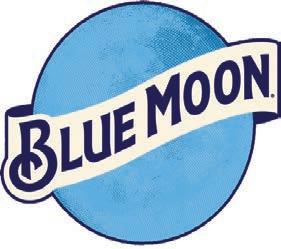







SPORTS

MUST- KNOW PENN ATHLETES
From football to basketball, here are fve big names donning the Red and Blue this year
JUSTIN LEE AND VALERI GUEVARRA Deputy Sports Editor and Sports Editor
With broken records and historical performances, last season was a big one for Penn sports. From national record holders to internationally ranked athletes, there was plenty of talent on the field and court. Here are five Penn student-athletes to keep an eye on this year.
Liam O’Brien — football In the middle of last season, it looked bleak for the Quakers. Then-senior starting quarterback Aidan Sayin went down with an injury during a matchup with Yale, and Penn was struggling to notch its first Ivy League win of the season. But then-junior quarterback Liam O’Brien took the spotlight. While the game against Yale ended in a loss, O’Brien proved himself as signal caller after Sayin was out of the game.
In his first collegiate start the following week, O’Brien led the Red and Blue to their first Ivy victory of the season against Brown. He then followed up that win by leading the team to a historic, dominant 67-49 victory against Cornell a week later — a performance soon dubbed as “Liamsanity.” Penn set the record for the most points scored since the start of Ivy League play in 1956, and O’Brien also set two program records for passing touchdowns and total touchdowns in a single game. He was named the FCS Offensive Player of the Week following the performance.
And that was only O’Brien’s second time as starting quarterback. With more experience under his belt and the chance for an Ivy League title now coming with a guaranteed spot in the FCS playoffs, the stage is set for him to have another electrifying season.
Brobbey | A guide to Penn
athletics for the 2025-26 school year
An essential guide on how to attend Penn athletics games, where to go, and how to be the best Quaker fan this upcoming season
AVERY BROBBEY
The sun is shining over Franklin Field once again as the student-athletes of Penn prepare for another year of chasing championships and records. From the men’s squash team having its first undefeated season to 2025 Wharton graduate Anna Brandt’s phenomenal record of 206 goals to become the highest scorer in Penn women’s lacrosse history, the 2024-25 school year was spectacular for Penn athletics, and this year will be no different.
After spending the summer both diligently training and resting before their seasons, 31 Red and Blue teams are prepared to dominate the Ancient Eight, and what they need most is support from their school. Here’s a guide on the mustknows about Penn sports and games.
Where do Penn athletics events take place?
Franklin Field is the biggest Penn athletics venue and is utilized by many teams, including football, men’s and women’s lacrosse, field hockey, and men’s and women’s track and field. With the illustrious Penn Medicine Pavilion building radiating over the turf, these teams have the opportunity to fight for victory in the oldest college football stadium in the nation. Named after Penn’s founder, Franklin Field hosts most of Penn’s greatest traditions, including the notable throwing of the toast where crowds of Quaker fans make a “toast” to “Dear Old Penn” after the third quarter of a football game. Additionally, the track surrounding Franklin Field is especially significant to many because of one main event: the Penn Relay Carnival. As the oldest and largest track and field competition in the United States with its first running in 1895, the
Penn Relays have graced that same track for over 100 years with no end in sight. Thousands of athletes, fans, and coaches from across the world work tirelessly to compete on this momentous stage, and the entirety of Penn’s campus is transformed into a sea of greatness when the time comes. Before the outdoor season commences in the spring, the men’s and women’s track and field teams compete at the newly established Ott Center for Track and Field for indoor events during the winter.
The Palestra, also known as the Cathedral of College Basketball, is another historic venue that is home to the men’s and women’s basketball, wrestling, volleyball, and gymnastics teams. No other basketball arena has hosted more visiting teams, regular season or postseason men’s basketball competition, or NCAA tournament games than the Palestra. However, the court is not just used for collegiate play. Multiple NBA teams have visited the historic site and neighboring Rockwell Gymnasium for practice, including the San Antonio Spurs, Golden State Warriors, and Memphis Grizzlies. Most recently, the reigning Super Bowl champions — the Philadelphia Eagles — held offseason training at the venue.
Another notable site is Rhodes Field, which is home to the men’s and women’s soccer teams. Though the stadium was under construction from 2021-24, the teams returned to their home field once again last season after playing in Penn Park during the renovation. With natural Bermuda grass and distinguished memories, Rhodes Field is especially valuable to Penn because of its nuanced home-field advantage: the bustling city surrounding the field. Because of the train tracks
Salman Khalil — men’s squash
With the US Squash headquarters located just across Market Street, it’s no surprise that Penn men’s squash has consistently been the nation’s best — and junior Salman Khalil has been at the center of it all.
Khalil has been a standout since his freshman season, collecting every major accolade including Ivy League Rookie of the Year, College Squash Association first team All-American, and a national team championship — the first in program history.
Khalil continued his streak of dominance during his sophomore year, achieving an undefeated individual record — which was instrumental in the team’s perfect 20-0 overall record. Khalil also collected an individual
national title in the CSA individual tournament — the first Quakers player to do so since 1979. Under the shining lights of the Arlen Specter US Squash Center, Khalil had a picture-perfect finish to the season, defeating Yale’s Tad Carney to clinch a second straight national team title for the Red and Blue. Khalil has a chance to continue his dominance this year amid the team’s quest for a “three-peat” and cementing a dynasty.
Katie Collins — women’s basketball During her freshman year, now-sophomore forward Katie Collins made her presence known on the court and across the Ivy League. Collins, who started all 27 games for the Quakers, excelled on
See ATHLETES, page 22
Yao | Changing the sports culture at Penn starts with you
VIVIAN YAO Former Sports Editor

What are the biggest schools in college athletics? The ones that come to mind probably include Michigan, Ohio State, Alabama, Texas, Louisiana State, Georgia, Notre Dame, Duke, North Carolina, or UConn. What unites those schools isn’t necessarily athletic performance — it’s the culture created by their students on game days. In 2024, despite a middling
